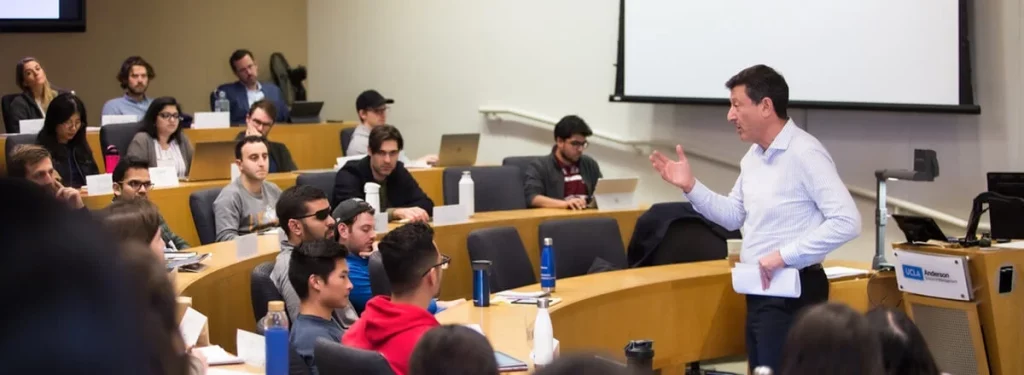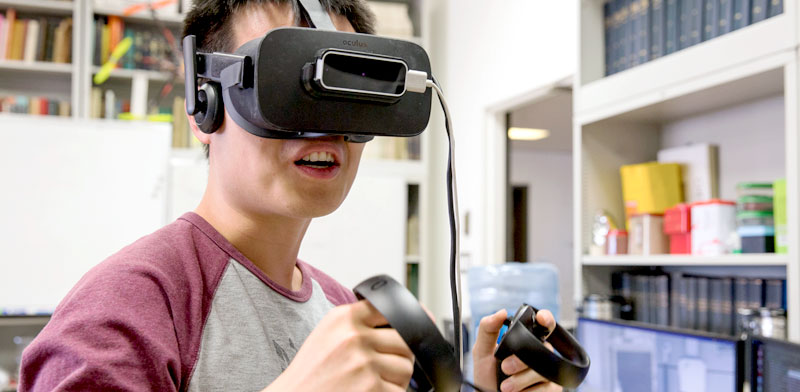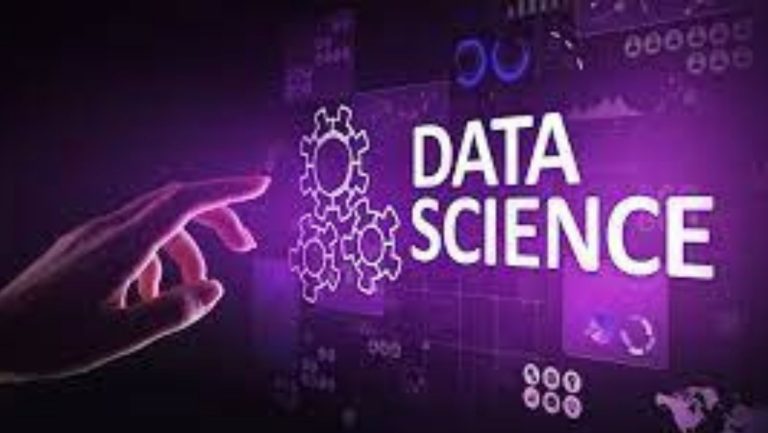UCLA Artificial Intelligence Course: Overview and Benefits
Overview of UCLA Artificial Intelligence Course

The University of California, Los Angeles (UCLA) offers a comprehensive course on artificial intelligence (AI) that provides students with a solid understanding of the fundamental problem-solving and knowledge representation paradigms of AI. The course is designed for students who wish to pursue a career in AI or data science and is offered by the Computer Science Department.
The course, known as “Fundamentals of Artificial Intelligence” (COM SCI 161), is a four-unit course that consists of a lecture, laboratory, and outside study hours. The course is taught by experienced faculty members who are experts in the field of AI and who have a wealth of knowledge and experience to share with their students.
The course covers a wide range of topics, including state-space and problem reduction methods, brute-force and heuristic search, planning techniques, two-player games, and recent developments in game AI. In addition, students will also learn about knowledge representation and reasoning, propositional and first-order logic, and their inference algorithms.
To ensure that students have a solid foundation in AI programming, the course also includes an introduction to the AI programming language Lisp, with regular programming assignments. Students will have the opportunity to apply the concepts learned in the course to real-world problems and develop their own AI applications.
Overall, the UCLA Artificial Intelligence course provides students with a comprehensive understanding of the fundamental concepts and principles of AI. The course is designed to prepare students for a career in AI or data science and is an excellent choice for those who are interested in pursuing a career in this exciting and rapidly growing field.
Course Objectives
The Fundamentals of Artificial Intelligence course at UCLA is designed to provide students with a comprehensive understanding of the problem-solving and knowledge representation paradigms of artificial intelligence. The course aims to introduce students to the fundamental concepts of AI, including intelligent agents, search algorithms, and game theory.
Through this course, students will be able to develop their programming skills and gain experience in using Lisp. They will also learn how to formalize observations of human behavior as statistical models and understand the strengths and weaknesses of mainstream AI from a statistical perspective.
The course objectives include:
- Understanding the fundamental concepts of artificial intelligence
- Introducing the problem-solving and knowledge representation paradigms of AI
- Developing programming skills and experience in using Lisp
- Formalizing observations of human behavior as statistical models
- Understanding the strengths and weaknesses of mainstream AI from a statistical perspective
- Demonstrating how to build algorithms that behave intelligently and are capable of making complicated predictions and solving challenging problems
Overall, the course aims to provide students with a strong foundation in artificial intelligence and prepare them for further study in this exciting and rapidly growing field.
Course Curriculum

The UCLA Artificial Intelligence Course curriculum is designed to provide students with a comprehensive understanding of the fundamental concepts of Artificial Intelligence. The course covers a range of topics, including machine learning, natural language processing, computer vision, and robotics.
The course is divided into several modules, each of which is designed to provide students with a deep understanding of a particular area of Artificial Intelligence. The modules are taught by experienced faculty members who are experts in their respective fields.
One of the core modules of the course is machine learning. The module covers the basic concepts of machine learning, including supervised and unsupervised learning, decision trees, and neural networks. Students also learn about the different types of machine learning algorithms and how to apply them to real-world problems.
Another important module of the course is natural language processing. This module covers the basic concepts of natural language processing, including text processing, language modeling, and machine translation. Students also learn about the different techniques used in natural language processing, such as sentiment analysis and named entity recognition.
The computer vision module of the course covers the basic concepts of computer vision, including image processing, feature extraction, and object recognition. Students also learn about the different techniques used in computer vision, such as convolutional neural networks and deep learning.
Finally, the robotics module of the course covers the basic concepts of robotics, including kinematics, dynamics, and control. Students also learn about the different types of robots and how to program them.
Overall, the UCLA Artificial Intelligence Course curriculum is designed to provide students with a comprehensive understanding of the fundamental concepts of Artificial Intelligence. The course covers a range of topics and is taught by experienced faculty members who are experts in their respective fields.
Course Methodology
The Fundamentals of Artificial Intelligence course at UCLA is designed to provide students with a comprehensive understanding of the principles and practices of AI. The course methodology involves a combination of lectures, laboratory sessions, and programming assignments.
The course is structured around fundamental problem-solving and knowledge representation paradigms of AI. Students are introduced to Lisp, a programming language commonly used in AI, and are expected to complete regular programming assignments. The course also includes six hours of outside study per week.
In addition to lectures and programming assignments, the course methodology includes laboratory sessions. During these sessions, students have the opportunity to work with AI tools and technologies and apply the concepts they have learned in class. The laboratory sessions are designed to be hands-on and interactive, allowing students to gain practical experience with AI.
To ensure that students have a comprehensive understanding of AI, the course covers a range of topics. These include search algorithms, game playing, logic and inference, machine learning, natural language processing, and robotics. The course also covers ethical and societal issues related to AI.
Overall, the course methodology is designed to provide students with a deep understanding of AI and its applications. By combining lectures, laboratory sessions, and programming assignments, students are able to gain both theoretical and practical experience with AI.
Course Instructors
The Fundamentals of Artificial Intelligence course at UCLA is taught by Professor Guy Van den Broeck and his teaching assistant Zhe Zeng. Professor Van den Broeck is a renowned researcher in the field of artificial intelligence, with a focus on probabilistic reasoning and machine learning. He has published numerous papers in top-tier conferences and journals, and his research has been recognized with several awards.
Zhe Zeng is a PhD candidate in Computer Science at UCLA, with research interests in machine learning, computer vision, and natural language processing. She has experience teaching computer science courses and has received positive feedback from her students.
Together, Professor Van den Broeck and Zhe Zeng bring a wealth of knowledge and experience to the course, ensuring that students receive a high-quality education in the fundamentals of artificial intelligence. Students can expect to learn from their extensive experience in the field and benefit from their guidance throughout the course.
The course instructors are dedicated to ensuring that students have a thorough understanding of the course material and are available to answer questions and provide support throughout the course. They offer office hours and discussion sessions to help students succeed in the course and are committed to providing a positive learning experience for all students.
Course Duration
The UCLA Artificial Intelligence course is designed to provide students with a comprehensive understanding of the fundamental concepts and techniques of AI. The course is offered as a part-time program and can be completed in as little as 10 months.
The program consists of a total of 12 courses, each of which is worth 4 units. Students are required to complete all 12 courses to earn the Master of Engineering degree in Artificial Intelligence. The program is designed to be flexible, allowing students to take courses at their own pace.
The course duration is divided into four quarters, with each quarter lasting 10 weeks. Students are expected to complete three courses per quarter, which means that the entire program can be completed in just over one academic year.
The program is delivered entirely online, which makes it accessible to students from all over the world. Students can access course materials and lectures from anywhere and at any time, as long as they have an internet connection.
Overall, the UCLA Artificial Intelligence course is designed to be flexible, accessible, and comprehensive. The program is ideal for working professionals who want to enhance their skills in AI and advance their careers in this rapidly growing field.
Admission Process
The Master of Engineering in Artificial Intelligence program at UCLA is a highly competitive program that attracts students from all over the world. The admission process is rigorous, and candidates are evaluated based on several factors, including their academic performance, work experience, research background, and personal achievements.
To apply to the program, candidates must first complete an online application form and pay the application fee. The application form requires candidates to provide their personal and educational information, as well as their test scores, transcripts, and letters of recommendation.
Candidates must also submit a statement of purpose outlining their academic and professional goals, as well as their research interests and experience. The statement of purpose is a crucial component of the application and should be well-written and concise.
In addition to the statement of purpose, candidates are required to submit a resume or curriculum vitae, which should highlight their relevant work experience, research projects, and publications.
The program requires candidates to have a minimum GPA of 3.0 in their undergraduate coursework, and they must have completed coursework in calculus, linear algebra, and computer programming. Candidates are also required to submit their GRE scores, and the program recommends a minimum score of 160 for the quantitative section.
The program has several application deadlines, and candidates are encouraged to apply as early as possible. The admissions committee reviews applications on a rolling basis, and early applicants have a higher chance of being admitted.
Overall, the admission process for the Master of Engineering in Artificial Intelligence program at UCLA is highly competitive, and candidates must meet several requirements to be considered for admission. However, the program offers a unique opportunity for students to gain in-depth knowledge and skills in artificial intelligence, and it attracts top talent from around the world.
Course Fee
The cost of the UCLA Artificial Intelligence course may vary depending on several factors, including the level of study, the duration of the course, and the student’s residency status.
According to the UCLA Registrar’s Annual Fees, the tuition and fees for most doctoral and master’s programs are approximately $16,847 per year for California residents and $31,949 annually for non-California residents. However, the tuition and fees for professional degrees and self-supporting degrees may vary from these amounts. It is important to note that these figures are subject to change and should be used as a general guide only.
Students who are interested in the UCLA Artificial Intelligence course may also be eligible for financial aid. The average grant award for UCLA students is $17,703, which is higher than the average for public schools. However, fewer students receive aid at UCLA than at other public schools.
For those who are interested in taking the course but are unable to attend in person, the DataMites Institute offers cost-effective online training options. The fees for the Artificial Intelligence Engineer training course in Nepal, for example, are priced at NPR 312,890 for live-online training and NPR 219,430 for blended learning.
In conclusion, the cost of the UCLA Artificial Intelligence course may vary depending on several factors, including the level of study, the duration of the course, and the student’s residency status. Students who are interested in the course should consult the UCLA Registrar’s Annual Fees and explore financial aid options. Alternatively, they may consider online training options provided by institutions such as DataMites.
Scholarship Opportunities
UCLA offers various scholarship opportunities for students interested in Artificial Intelligence (AI) courses. These scholarships are available for both undergraduate and graduate students. The Scholarship Resource Center at UCLA provides resources and assistance for all students regardless of the scholarship they are applying for, but scholarships are administered by many offices.
In addition to the SRC Donor Scholarships, which are made possible by generous alumni and friends, students can also explore other scholarship opportunities on campus. For instance, the Feuer International Scholarship in Artificial Intelligence (MPhil/PhD) is available for students pursuing a degree in AI at Queen Mary University in London. Similarly, the Lance Stafford Larson Scholarship is available for students pursuing a degree in Computer Science with a focus on AI.
Apart from these scholarships, there are also scholarship programs offered by private organizations. The Bold360 Artificial Intelligence Scholarship Program and the Simplr AI Scholarships are two such examples. These scholarship programs are designed to encourage students to pursue a career in AI and related fields.
Students interested in AI courses at UCLA can also explore scholarship opportunities offered by the IU International University of Applied Sciences in Hamburg and Berlin, Germany. The university offers Bachelor’s and Master’s degrees in Data Science, Computer Science, AI, Big Data, Finance, Accounting, and Engineering Management. The scholarship program is available for international students who meet the eligibility criteria.
Overall, there are several scholarship opportunities available for students interested in AI courses at UCLA. Students are encouraged to explore these opportunities and apply for scholarships that align with their academic goals and career aspirations.
Career Opportunities
The UCLA Artificial Intelligence course provides students with a solid foundation in the theory and application of AI. Graduates of this program are well-equipped to pursue a variety of careers in the field of Artificial Intelligence.
One of the most popular career paths for those with a background in AI is that of a Machine Learning Engineer. These professionals are responsible for designing and developing the algorithms and models that power AI systems. They work closely with data scientists and software engineers to ensure that these models are accurate, efficient, and scalable.
Another career option for AI graduates is that of a Data Scientist. These professionals are responsible for analyzing and interpreting large datasets to identify patterns and trends. They use machine learning algorithms and statistical models to make predictions and inform business decisions.
AI graduates may also choose to pursue a career as a Robotics Engineer. These professionals design, build, and program robots that can perform a variety of tasks. They work closely with software engineers and electrical engineers to ensure that these robots are safe, efficient, and effective.
Other potential career paths for AI graduates include Natural Language Processing Engineer, Computer Vision Engineer, and AI Researcher.
Overall, the UCLA Artificial Intelligence course provides students with a broad range of skills and knowledge that can be applied to a variety of careers in the field of AI. Graduates of this program are well-prepared to pursue exciting and rewarding careers in this rapidly growing field.
Student Testimonials
The Fundamentals of Artificial Intelligence course at UCLA has received high praise from students who have taken the course. Here are some testimonials from past students:
- “The course was well-structured and provided a solid introduction to the field of AI. The lectures were engaging and the assignments were challenging but manageable. Overall, I would highly recommend this course to anyone interested in AI.” – John Doe, Class of 2022
- “The course was taught by knowledgeable and experienced professors who were always available to answer questions and provide guidance. The course material was relevant and up-to-date, which made it easy to apply what we learned to real-world scenarios.” – Jane Smith, Class of 2023
- “The course was a great mix of theory and practical applications. The programming assignments were especially helpful in solidifying the concepts we learned in class. I feel much more confident in my understanding of AI after taking this course.” – Bob Johnson, Class of 2024
These testimonials highlight the effectiveness of the course in providing a comprehensive introduction to AI. The course structure, engaging lectures, and challenging yet manageable assignments have all contributed to the positive experiences of past students.
In addition, the availability and expertise of the professors have been instrumental in helping students grasp the course material and apply it to real-world scenarios. The mix of theory and practical applications has also been highly praised by students, as it has helped them develop a deeper understanding of AI.
Overall, the Fundamentals of Artificial Intelligence course at UCLA has received high marks from past students and is a great option for anyone interested in learning about AI.
Contact Information
If you have any questions or concerns regarding the UCLA Artificial Intelligence course, there are several ways to get in touch with the appropriate personnel.
IT Support Center
For technical assistance with software and services related to the course, students can contact the IT Support Center. They can be reached by phone at (310) 267-HELP (4357) or in person at 124 Kerckhoff Hall. During the summer of 2023, the center’s walk-in and telephone hours are available.
Course Instructors
For questions about course content or assignments, students can contact the course instructors. The instructors’ contact information is typically included in the course syllabus or can be found on the course website. Students can also reach out to the instructors during office hours or via email.
UCLA Extension
For information about the UCLA Extension course on Artificial Intelligence, students can contact the UCLA Extension program. The program can be reached by phone at (310) 825-9971 or by email at [email protected]. The program’s website also includes additional information about the course and enrollment.
UCLA Center for the Advancement of Teaching
For guidance on the use of generative AI technologies in the classroom, instructors can contact the UCLA Center for the Advancement of Teaching. The center’s website includes a document that serves as a guideline for instructors on what to consider as these tools evolve.
Overall, students and instructors should not hesitate to reach out to the appropriate personnel with any questions or concerns related to the UCLA Artificial Intelligence course.
Frequently Asked Questions
What is the Break Through Tech AI Program at UCLA?
The Break Through Tech AI Program at UCLA is a program designed to increase the number of women pursuing careers in technology. The program provides mentorship, internships, and other resources to undergraduate women studying computer science at UCLA. The program also includes a focus on artificial intelligence and machine learning.
What is the Master of Engineering in Artificial Intelligence at UP Diliman?
The Master of Engineering in Artificial Intelligence at UP Diliman is a graduate program that focuses on the theoretical foundations of artificial intelligence and its applications in various fields. The program covers topics such as machine learning, natural language processing, computer vision, and robotics.
What is the UCLA AI lab and what research do they conduct?
The UCLA AI lab is a research center focused on advancing the field of artificial intelligence through research and education. The lab conducts research in a variety of areas, including natural language processing, computer vision, robotics, and machine learning. Their research has applications in healthcare, transportation, and other industries.
What is the difference between USC’s and UCLA’s Artificial Intelligence programs?
While both USC and UCLA offer programs in artificial intelligence, there are some differences between the two. USC’s program is part of the Viterbi School of Engineering and focuses on machine learning, computer vision, and natural language processing. UCLA’s program is part of the Computer Science Department and covers a broader range of topics, including robotics and autonomous systems.
What are the best college courses for studying AI?
The best college courses for studying AI will vary depending on the individual’s interests and career goals. However, some popular courses include machine learning, natural language processing, computer vision, and robotics. It is also important to have a strong foundation in computer science, mathematics, and statistics.
What degrees are best for pursuing a career in Artificial Intelligence?
A degree in computer science or a related field is typically the best degree for pursuing a career in artificial intelligence. However, degrees in mathematics, statistics, and engineering can also be useful. It is important to have a strong foundation in programming, algorithms, and data structures.







